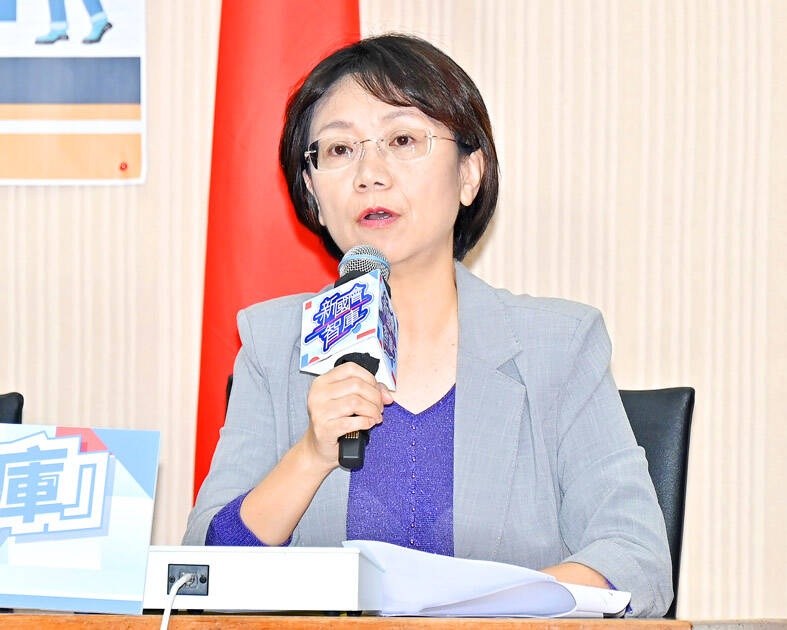Taiwan’s sovereignty and national security are in danger of being undermined from within by a proposed amendment from Chinese Nationalist Party (KMT) Legislator Weng Hsiao-lin (翁曉玲) that would allow military and key government officials to salute China’s national flag, sing the Chinese national anthem and engage in other actions that recognize Beijing government’s political authority, Democratic Progressive Party (DPP) lawmakers said.
Weng’s proposal amounts to opening the door for Taiwan’s retired military generals to take up Chinese propaganda warfare and ‘united front” (統戰) efforts by Beijing to subvert Taiwanese sovereignty, DPP Legislator Puma Shen (沈伯洋) said.
“We see these actions as treason ... to sell out Taiwan to China,” Shen said, adding that Weng’s proposal is the opposite of efforts by DPP lawmakers to safeguard national security against infiltration and subversion by China.

Photo: Tu Chien-jung, Taipei Times
DPP Legislator Hung Sun-han (洪申翰) said that Weng “is dismantling the protective walls safeguarding Taiwan national security, by proposing to remove the laws protecting our national sovereignty.”
Weng in her heart wants to sing the Chinese national anthem and identifies China as her motherland, Hung said, asking whether other KMT officials support Weng’s proposal or view it as representative of the KMT’s party platform.
New Power Party Chairwoman Claire Wang (王婉諭) separately accused Weng of “working in Taiwan’s legislature as a foot soldier for China.”
She added that Weng’s proposal to permit retired generals to show loyalty to Chinese government “is a grave insult to all Taiwanese taxpayers who pay a portion of their hard-earned income toward the generous pensions of these military officials.”
“I want to know if KMT Chairman Eric Chu (朱立倫) supports Weng’s proposal, which severely endangers Taiwan national sovereignty, and if the whole party agrees with it,” Wang said.
“Are KMT members not aware that China’s political doctrine calls for a military invasion of Taiwan?” she said.
Weng referred to her proposal as a “individual human rights” and “freedom of expression” issue. Earlier this week, she collected sufficient signatures from fellow KMT legislators to propose removing Article 9-3 of the amended Act Governing Relations between the People of the Taiwan Area and the Mainland Area (台灣地區與大陸地區人民關係條例).
The article imposed a ban on active-duty military personnel and retired military personnel of major general or higher rank from engaging in acts such as saluting China’s national flag or its emblems, singing Chinese anthems or any other behaviors that recognize China’s political authority.
The same restrictions apply to senior civilian officials in the Ministry of Foreign Affairs and the Mainland Affairs Council, as well as senior officers in national security agencies.

Chinese Nationalist Party (KMT) Chairman Eric Chu (朱立倫), spokeswoman Yang Chih-yu (楊智伃) and Legislator Hsieh Lung-chieh (謝龍介) would be summoned by police for questioning for leading an illegal assembly on Thursday evening last week, Minister of the Interior Liu Shyh-fang (劉世芳) said today. The three KMT officials led an assembly outside the Taipei City Prosecutors’ Office, a restricted area where public assembly is not allowed, protesting the questioning of several KMT staff and searches of KMT headquarters and offices in a recall petition forgery case. Chu, Yang and Hsieh are all suspected of contravening the Assembly and Parade Act (集會遊行法) by holding

PRAISE: Japanese visitor Takashi Kubota said the Taiwanese temple architecture images showcased in the AI Art Gallery were the most impressive displays he saw Taiwan does not have an official pavilion at the World Expo in Osaka, Japan, because of its diplomatic predicament, but the government-backed Tech World pavilion is drawing interest with its unique recreations of works by Taiwanese artists. The pavilion features an artificial intelligence (AI)-based art gallery showcasing works of famous Taiwanese artists from the Japanese colonial period using innovative technologies. Among its main simulated displays are Eastern gouache paintings by Chen Chin (陳進), Lin Yu-shan (林玉山) and Kuo Hsueh-hu (郭雪湖), who were the three young Taiwanese painters selected for the East Asian Painting exhibition in 1927. Gouache is a water-based

Taiwan would welcome the return of Honduras as a diplomatic ally if its next president decides to make such a move, Minister of Foreign Affairs Lin Chia-lung (林佳龍) said yesterday. “Of course, we would welcome Honduras if they want to restore diplomatic ties with Taiwan after their elections,” Lin said at a meeting of the legislature’s Foreign Affairs and National Defense Committee, when asked to comment on statements made by two of the three Honduran presidential candidates during the presidential campaign in the Central American country. Taiwan is paying close attention to the region as a whole in the wake of a

OFF-TARGET: More than 30,000 participants were expected to take part in the Games next month, but only 6,550 foreign and 19,400 Taiwanese athletes have registered Taipei city councilors yesterday blasted the organizers of next month’s World Masters Games over sudden timetable and venue changes, which they said have caused thousands of participants to back out of the international sporting event, among other organizational issues. They also cited visa delays and political interference by China as reasons many foreign athletes are requesting refunds for the event, to be held from May 17 to 30. Jointly organized by the Taipei and New Taipei City governments, the games have been rocked by numerous controversies since preparations began in 2020. Taipei City Councilor Lin Yen-feng (林延鳳) said yesterday that new measures by